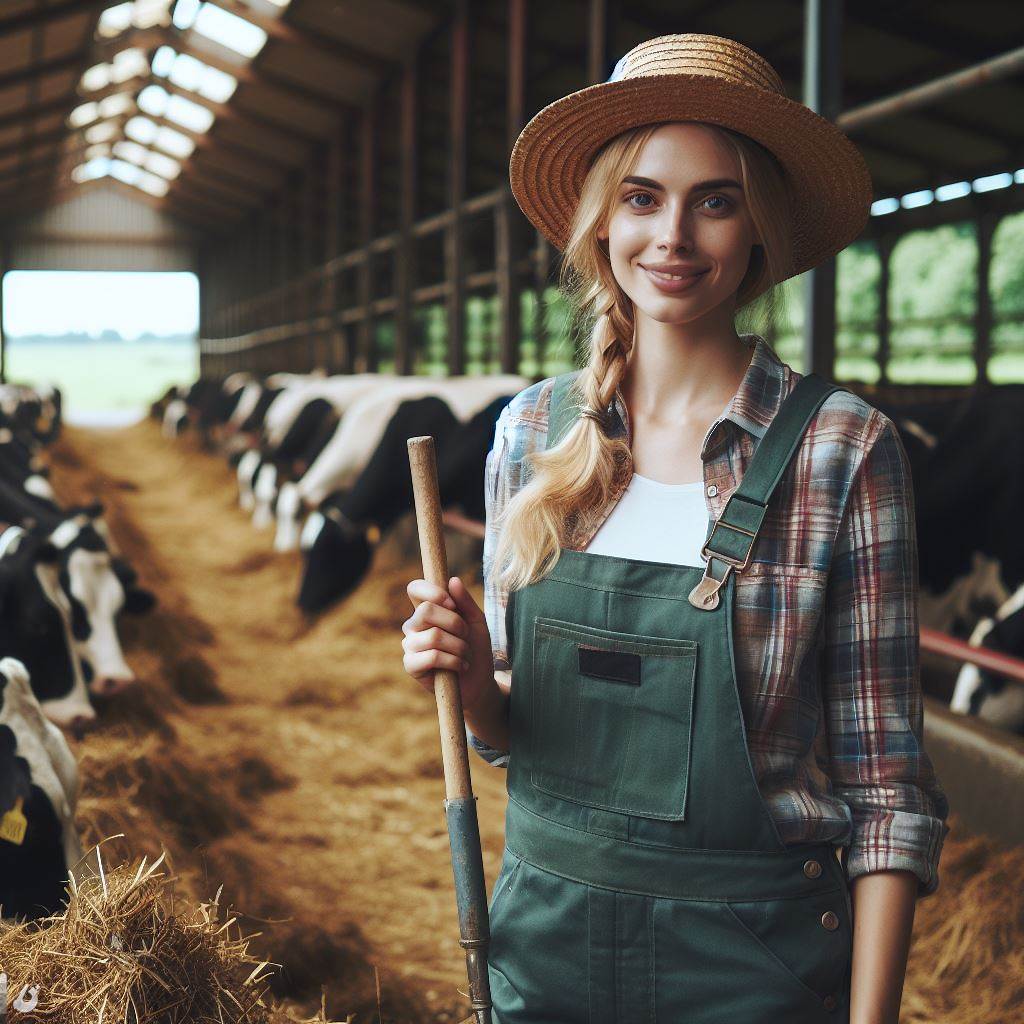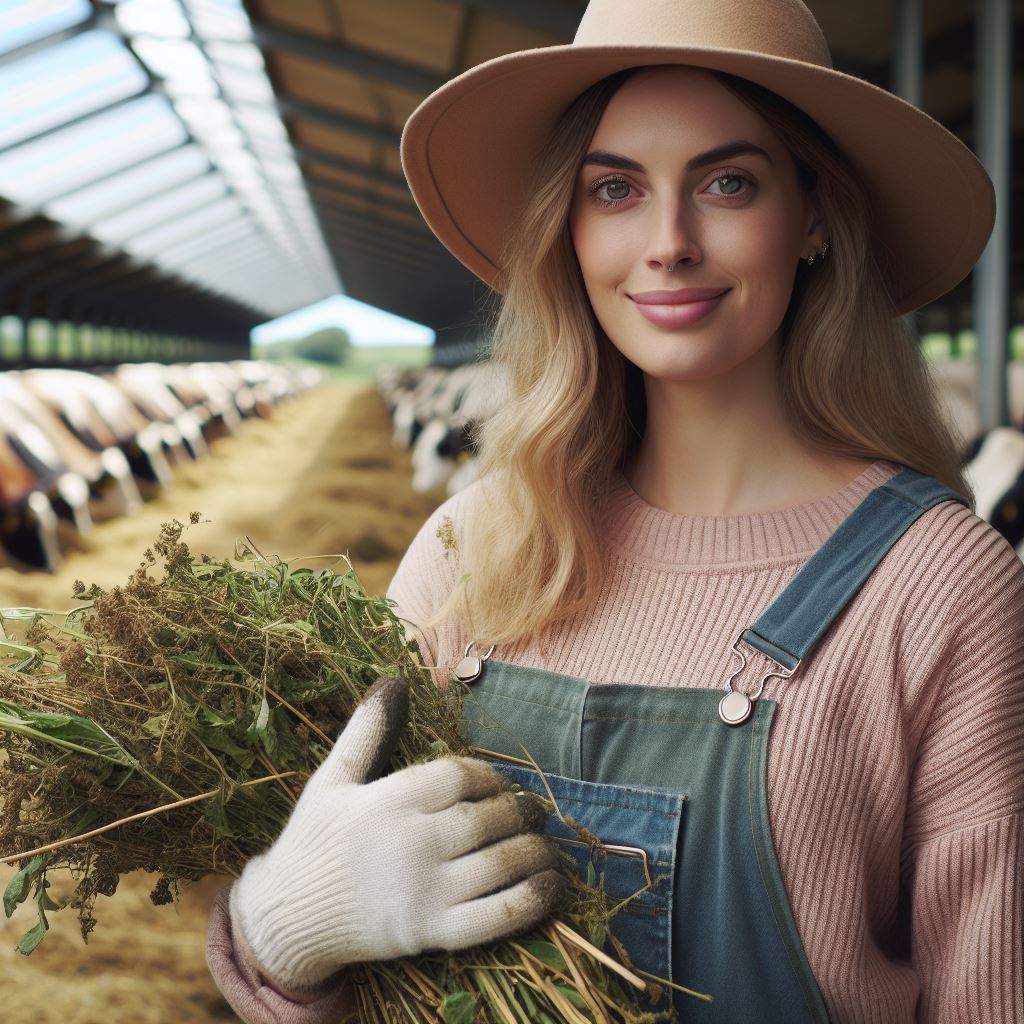Introduction
Urban farming refers to the practice of cultivating food and other agricultural products within urban areas.
It involves growing plants and raising animals in cities, using various methods such as rooftop gardens, vertical farming, and hydroponics.
In recent years, the UK has witnessed a significant increase in urban farming initiatives.
People are increasingly recognizing the benefits of producing food locally, reducing their carbon footprint, and enhancing food security.
This blog post aims to explore the opportunities and trends in urban farming in the UK.
By examining the current scenario, we can identify the potential areas for growth, highlight successful projects, and analyze the factors driving this movement.
Furthermore, we will discuss the various challenges faced by urban farmers in the UK and how they have overcome them to thrive in this industry.
This will provide valuable insights for aspiring urban farmers and policymakers looking to support sustainable agriculture in urban areas.
Through this blog section, we hope to inspire readers to consider urban farming as a viable option for food production, contribute to the local economy, and foster a stronger sense of community.
Alternative farming methods can revolutionize how we think about agriculture, and the UK has the potential to become a leader in this innovative and sustainable practice.
The Benefits of Urban Farming
Increased access to fresh and locally grown produce
- Urban farming provides communities with easy access to fresh and nutritious produce.
- Locally grown food reduces the need for long-distance transportation, resulting in higher quality and flavor.
- Urban farmers can harvest their crops at peak ripeness, offering consumers superior taste and nutritional value.
Reduction of food miles and carbon footprint
- By growing food within the city, urban farming reduces the distance food travels from farm to plate.
- This significantly decreases the carbon emissions associated with transportation, addressing climate change concerns.
- Reduced food miles also contribute to sustainable agriculture and a greener environment.
Improvement of community health and well-being
- Urban farming encourages healthier eating habits by increasing access to organic, pesticide-free produce.
- Communities engaged in urban farming experience improved physical fitness through active participation in gardening activities.
- The nurturing process involved in urban farming can also have a positive impact on mental health and overall well-being.
Creation of green spaces and urban aesthetics
- Urban farming transforms vacant lots, rooftops, and other underutilized spaces into vibrant green areas.
- These green spaces enhance the visual appeal of cities, promoting urban aesthetics and a sense of community pride.
- Residents can enjoy the beauty of nature and connect with their surroundings, even in urban environments.
In essence, urban farming offers numerous advantages that positively impact both individuals and communities.
By increasing access to fresh produce, reducing carbon emissions, promoting healthier lifestyles, and creating green spaces, urban farming contributes to the overall well-being of urban dwellers.
It is a sustainable and aesthetically pleasing solution to the challenges of food security and environmental sustainability in the UK and around the world.
Read: A Day in the Life of a UK Forester
Opportunities in Urban Farming
Explore the various opportunities available in urban farming
Urban farming in the UK offers a multitude of opportunities for individuals and communities to engage in sustainable and productive agricultural practices.
Personalized UK Career Consulting
Receive tailored career guidance designed just for you. Get actionable steps and expert support to boost your career in 1-3 days. Take control of your career now.
Get StartedFrom rooftop gardens to hydroponics setups, here are some of the various opportunities available:
Rooftop gardens and greenhouses
Utilizing rooftops for agricultural purposes is a growing trend in urban farming. By converting unused rooftop spaces into gardens or installing greenhouses, individuals can grow a variety of crops and plants.
Vertical farming systems
Vertical farming involves growing crops in vertically stacked layers, using artificial lighting and controlled environments.
This innovative technique maximizes space utilization in urban areas while increasing crop yields.
Community gardens and allotments
Community gardens and allotments play a crucial role in promoting social cohesion and food security in urban areas.
These shared spaces provide opportunities for people to grow their own produce and foster a sense of community.
Hydroponics and aquaponics setups
Hydroponics and aquaponics are soilless cultivation methods that allow for the production of vegetables and fish in urban settings.
These systems require less water, space, and resources compared to traditional farming methods.
Micro-greens and herbs cultivation
Micro-greens and herbs cultivation is a niche opportunity in urban farming.
These quick-growing and nutrient-dense crops can be easily grown indoors or on small balconies, providing fresh and flavorful additions to meals.
Urban beekeeping and honey production
Beekeeping in urban areas not only supports pollination but also provides the opportunity to produce honey.
Urban beekeepers can create honeybee hives on rooftops, gardens, or balconies, contributing to local biodiversity.
These opportunities in urban farming offer a range of benefits, including improved access to fresh and locally grown food, increased food security, and sustainable utilization of urban space.
Engaging in urban farming not only provides individuals with a rewarding hobby but also contributes to greater environmental and community well-being.
Your Dream Job Starts with a Perfect CV
Get a tailored CV and cover letter that captures your unique strengths and stands out in your industry. Let us help you make an unforgettable first impression.
Get StartedRead: Forestry Careers: Paths and Progressions
Challenges and Solutions
Challenges Faced in Urban Farming
Urban farming faces several challenges that can hinder its growth and sustainability. However, with innovative solutions, these challenges can be overcome.
- Limited space and land availability: One of the primary challenges of urban farming is the scarcity of available space and suitable land for cultivating crops.
- Noise and pollution in urban areas: Urban environments are often characterized by high levels of noise and pollution, which can negatively impact crop growth and health.
- Lack of knowledge and skills: Many urban farmers lack the necessary knowledge and skills to efficiently manage crops and maximize yield.
- Financial constraints: The cost of setting up and maintaining an urban farm can be a major barrier for aspiring farmers.
Solutions to Overcome the Challenges
By implementing these solutions, urban farming can overcome its challenges and thrive in the UK.
Technology-driven farming techniques
The use of advanced technologies, such as hydroponics and vertical farming, can help optimize space and increase productivity.
Technology-driven farming techniques enable urban farmers to make the most of limited space and land availability.
Hydroponics, for example, allows crops to be grown without soil, using nutrient-rich water solutions.
Additionally, vertical farming involves stacking crops in multiple layers, utilizing vertical space effectively.
These techniques not only optimize space but also ensure high crop yields by providing precise control over environmental factors.
Creative utilization of available space
Urban farmers can explore creative ways to utilize rooftops, balconies, and small plots of land to maximize agricultural potential.
Creative utilization of available space is another valuable solution. Rooftop gardens, community gardens, and even vertical gardens on walls are all creative ways to utilize unused urban spaces.
By turning rooftops and other underutilized areas into productive farms, urban farmers can take advantage of available space and contribute to local food production.
Collaboration with local communities and organizations
Building partnerships with local communities, schools, and organizations can provide access to additional resources and support.
Collaboration with local communities and organizations is crucial for the success of urban farming. Schools can provide educational programs and involve students in hands-on farming activities.
Partnering with local restaurants, markets, and food banks can create a direct market for urban farmers’ produce, ensuring a sustainable income stream.
Optimize Your LinkedIn for Success
Boost your LinkedIn profile with a professional bio, keyword-rich headline, and strategic recommendations that attract recruiters. Stand out from the crowd and get noticed.
Optimize NowAdditionally, community involvement creates a sense of ownership and support for urban farming initiatives.
Government incentives and support
Government bodies can offer financial incentives, grants, and supportive policies to encourage.
To sustain urban farming initiatives, government incentives and support play a vital role in promoting urban farming.
Financial assistance, in the form of grants or low-interest loans, can alleviate the financial constraints faced by urban farmers.
Moreover, supportive policies that encourage the conversion of unused or underutilized urban spaces into agricultural areas can facilitate the expansion of urban farming.
By providing these incentives, the government acknowledges the importance of urban farming for food security and sustainability.
In general, while urban farming faces challenges such as limited space, noise pollution, lack of knowledge, and financial constraints, innovative solutions can be implemented to overcome these barriers.
Embracing technology, utilizing available space creatively, fostering community collaboration, and receiving government support are key strategies to ensure the success and growth of urban farming in the UK.
Read: UK Farming Subsidies: Understanding the Basics

See Related Content: Seasonal Fishing in the UK: A Fisherman’s Guide
Trends in Urban Farming
The emerging trends in urban farming
Increase in rooftop farms and vertical gardens
Urban farming is expanding upwards with the rise of rooftop farms and vertical gardens. These innovative methods make use of limited space efficiently.
Integration of smart farming technologies
Urban farmers are embracing technology to optimize their farming practices. Smart farming technologies enable precise monitoring, automation, and data-driven decision-making.
Focus on organic and sustainable farming practices
There is a growing emphasis on organic and sustainable farming methods in urban areas. People are seeking locally grown, chemical-free produce to improve their health and support the environment.
Rise of social entrepreneurship in urban farming
Urban farming has become a platform for social entrepreneurship, combining business with social and environmental impact. Many urban farms also serve as community spaces and provide job opportunities.
Growing interest in urban livestock-keeping
In addition to crops, urban farmers are also exploring livestock-keeping. Raising chickens, goats, or bees in urban settings allows for the production of fresh eggs, milk, honey, and natural pest control.
Urban farming is undergoing exciting changes as new trends emerge and gain popularity.
Why are these trends important?
These trends are important for several reasons. One, rooftop farms and vertical gardens address the scarcity of available land in urban areas. They enable food production without encroaching on valuable space.
Second, the integration of smart farming technologies enhances productivity and efficiency.
With automated irrigation systems, sensor-based monitoring, and data analytics, urban farmers can make informed decisions and maximize yields.
Third, focusing on organic and sustainable farming practices promotes environmental health and food security.
By reducing chemical inputs and implementing responsible farming techniques, urban farmers contribute to a healthier ecosystem and provide nutrient-rich produce to the community.
Moreover, the rise of social entrepreneurship in urban farming brings economic benefits to communities.
These initiatives create jobs, support local businesses, and empower individuals to develop their skills and generate income.
Lastly, urban livestock-keeping adds diversity to urban farming and allows for a more self-sufficient food system.
It provides an opportunity to produce animal-based products sustainably and fosters a deeper connection between urban dwellers and the food they consume.
The future of urban farming
The emerging trends indicate a promising future for urban farming in the UK. As more people recognize the importance of local food production, the demand for urban-grown produce will likely continue to rise.
With advancements in technology, urban farming will become even more efficient and productive.
Smart farming technologies will become increasingly accessible and affordable, enabling more individuals to participate in urban agriculture.
Furthermore, the integration of social entrepreneurship with urban farming will create stronger community bonds and address social inequalities.
It opens up opportunities for collaboration, education, and the development of sustainable and inclusive food systems.
To ensure the success of urban farming, it is crucial for policymakers to support these trends through favorable regulations, incentives, and funding.
Government support can foster innovation, create jobs, and enable more sustainable urban living.
Urban farming transforms cities with rooftop farms, smart technologies, organic methods, social entrepreneurship, and urban livestock-keeping, revolutionizing urban agriculture.
These trends contribute to a more sustainable, resilient, and inclusive food system, benefiting both urban dwellers and the environment.
Read: UK Crop Farming: Trends and Techniques
Gain More Insights: Modern Fishing Gear: UK Fishermen’s Toolkit
Discover More: Forestry: Balancing Economy and Ecology
Success Stories in UK Urban Farming
Profile successful urban farming initiatives in the UK
Urban farming is gaining traction in the UK as a sustainable solution to food production.
Several successful initiatives have emerged across the country, showcasing the potential of urban agriculture to transform our cities. Let’s explore some inspiring success stories:
Growing Underground in London
Growing Underground is an innovative urban farming project located beneath the streets of London.
Using hydroponics and LED technology, they cultivate a variety of herbs and microgreens in an abandoned World War II air raid shelter.
Their sustainable farming practices have resulted in high-quality produce, with restaurants and retailers clamoring for their fresh, pesticide-free greens.
Moss Brook Growers in Manchester
Moss Brook Growers is a community-driven urban farm situated in Manchester. What started as a grassroots initiative has now flourished into a thriving urban agriculture project.
With the help of volunteers, they grow a diverse range of vegetables, fruits, and herbs in polytunnels.
Their produce is sold through a community-supported agriculture scheme, connecting city dwellers with locally grown food.
The Good Gardeners in Birmingham
The Good Gardeners is a social enterprise in Birmingham that has transformed vacant lots into productive urban farms.
They focus on creating sustainable food systems, providing fresh produce for low-income communities.
In addition to growing nutritious food, they also offer training programs and workshops to educate people on urban farming techniques.
BioCity in Nottingham
BioCity is not just a famous science park; it is also home to an impressive urban farm.
This vertical farm utilizes hydroponics and aeroponics to grow a wide range of crops in a controlled environment.
By optimizing space and resources, they are able to harvest a significant quantity of vegetables and herbs, ensuring a constant supply of fresh produce for residents and local businesses.
Farm Urban in Liverpool
Farm Urban is a pioneering urban farming initiative in Liverpool. They operate several indoor farms across the city, including one located within a university building.
Through aquaponics, they cultivate leafy greens and fish in a symbiotic system.
This innovative approach not only produces sustainable food but also serves as an educational hub, inspiring future generations to engage with urban farming.
These success stories from across the UK urban farming landscape demonstrate the potential and versatility of this practice.
Urban farmers demonstrate sustainable, locally sourced food growth in our urban jungles by utilizing underground spaces, transforming vacant lots, and implementing innovative farming techniques.
By supporting and learning from these initiatives, we can pave the way for a healthier, more self-sufficient future.
See Related Content: Financial Planning for UK Farm Managers
Conclusion
This blog section explored the opportunities and trends of urban farming in the UK.
We discussed how urban farming can address food security, promote community engagement, and provide economic benefits.
By encouraging readers to explore urban farming opportunities in their local communities, we hope to promote awareness and encourage participation in this sustainable practice.
Urban farming has the potential to transform cities by creating green spaces, improving air quality, and reducing food waste.
It can contribute to a more sustainable future by promoting localized food production and reducing the carbon footprint associated with traditional agriculture.
We urge readers to support and get involved in initiatives that promote urban farming, such as community gardens, rooftop gardens, and hydroponic systems.
By engaging in urban farming, individuals can contribute to a more resilient and sustainable food system while enjoying the benefits of fresh, nutritious produce.
In the end, urban farming presents exciting possibilities for transforming our cities and building a more sustainable future.
By exploring and supporting urban farming opportunities, we can take small steps towards creating greener, healthier, and more self-sufficient communities.
Let us all embrace urban farming and work towards a more sustainable and resilient future.




